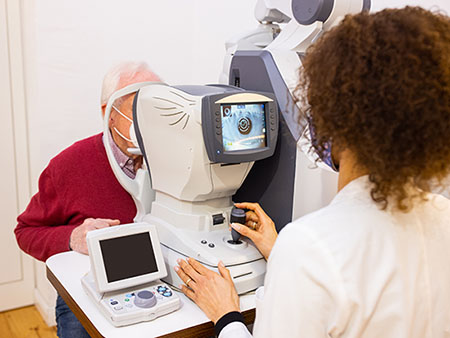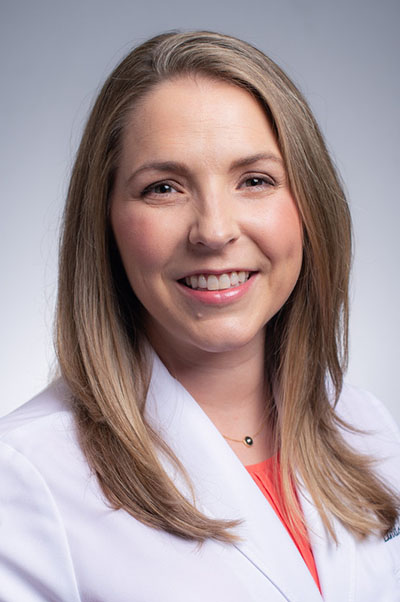 Patients of Cahaba Medical Care Federally Qualified Health Clinics, in the towns of Marion, Centreville and Maplesville, Alabama, can receive vision screening and testing for glaucoma, diabetic retinopathy and other eye diseases.Free vision screening and eye testing are now being offered to patients at some Cahaba Medical Care primary care clinics, as part of a new study by researchers at the University of Alabama at Birmingham Department of Ophthalmology and Visual Sciences.
Patients of Cahaba Medical Care Federally Qualified Health Clinics, in the towns of Marion, Centreville and Maplesville, Alabama, can receive vision screening and testing for glaucoma, diabetic retinopathy and other eye diseases.Free vision screening and eye testing are now being offered to patients at some Cahaba Medical Care primary care clinics, as part of a new study by researchers at the University of Alabama at Birmingham Department of Ophthalmology and Visual Sciences.
The program aims to prevent vision loss among some of the state’s most vulnerable residents. Although early detection and treatment are critical for preventing vision loss and blindness, approximately 50 percent of people with glaucoma and 25 percent of people with diabetic retinopathy go undiagnosed and do not know they have these eye conditions.
“In rural areas with few eye care providers, people often delay getting routine eye exams,” said Lindsay A. Rhodes, M.D., MSPH, associate professor of ophthalmology at UAB and principal investigator of the Screening and Intervention for Glaucoma and eye Health through Telemedicine study, funded by the Centers for Disease Control and Prevention. “We hope that bringing our vision screening to people close to where they live will lead to earlier detection, follow-up eye care, and treatment of glaucoma, cataracts and diabetic retinopathy in people who may not have access to regular eye exams.”
On-site vision screening
The program, which has already screened more than 100 people at the Cahaba Medical Care clinics in Marion and Maplesville, will expand to the Centreville clinic in June. A UAB research coordinator is at the clinic sites each week to enroll participants in the study protocol, which includes screening for vision impairment, cataracts, glaucoma, diabetic retinopathy and age-related macular degeneration with high-tech imaging equipment.
Members of the screening team have been vaccinated against COVID-19 and wear personal protective equipment at every visit. Participants are asked COVID-19 symptom questions and given temperature checks, along with hand sanitizer and a mask, before vision screening.
The screening information and eye images are sent electronically to researchers at UAB, who review them for any abnormalities or eye disease. Participants with vision impairment get a referral for a comprehensive eye exam with an optometrist or ophthalmologist.
 Lindsay A. Rhodes, M.D.
Lindsay A. Rhodes, M.D.
(Photo by: Lexi Coon)Vision impairments more common among Blacks and Hispanics
The UAB program is focused on improving eye health among Alabama residents at greatest risk of vision impairment, glaucoma, cataracts and diabetic retinopathy. Studies show that glaucoma and diabetic retinopathy — the two leading causes of blindness — disproportionately affect low-income and other vulnerable populations. One study found that, compared to whites, Black Americans have three to four times the risk of glaucoma and tend to develop it at an earlier age; another found that Hispanics are nearly twice as likely as whites to develop diabetic retinopathy.
Many patients of these FQHCs are Black and/or Hispanic, and vision screening and eye testing are available to those over age 40.
Program’s success will be measured
The researchers will determine whether offering vision screening and eye testing where people receive their primary care improves detection of vision impairment and eye diseases. They will also evaluate whether the use of financial incentives will increase adherence to follow-up appointments.
“If successful, the program could be expanded to other at-risk communities in Alabama, as well as at other FQHCs across the nation,” Rhodes said.
More information
Patients of Cahaba Medical Care who are Black or Hispanic and age 40 and older, non-Hispanic white and over age 50, or anyone with diabetes or a family history of glaucoma and age 18 or older are eligible to participate by calling 205-825-7540. Additional information about enrolling in the program can be found at SIGHTSTUDIES.org.
More information about the vision screening program can be found here.
The project, “Using Telemedicine to Prevent Blindness in an At-Risk Rural Alabama Population,” is funded with a Cooperative Agreement from the National Center for Chronic Disease Prevention and Health Promotion at the Centers for Disease Control and Prevention Vision Health Initiative (5U01DP006441).